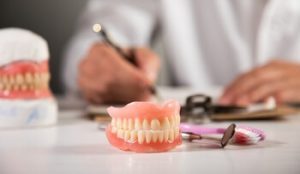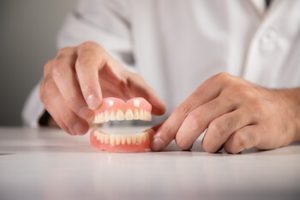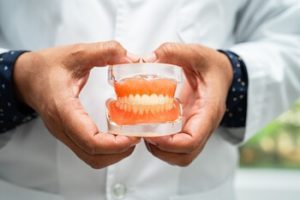No one likes wearing dentures, but it doesn’t mean life should come to a standstill. Many people with dentures can still enjoy eating all the same foods as before – at least if they take extra precautions. Eating with dentures isn’t without its challenges, but it is certainly possible, and many tips and tricks are available to make the process more successful and enjoyable.
In this blog post, we explore how you can eat your favourite foods even with new or ill-fitting dentures – from practical advice when chewing certain types of food to understanding what modifications may be needed from your dentist for comfortable dining. So whether you’re an experienced denture wearer or just starting on your dental journey, let’s look together at what options are available so that eating with full confidence can be a reality!
Tips for Chewing Different Types of Food
Whether you’re munching on a crisp apple or want to eat steak, this section will cover a few basic tips on how to eat solid food with dentures.
Start slow
New denture wearers should start with soft foods and gradually reintroduce solid foods. Begin by eating soft foods like mashed potatoes, scrambled eggs, and cooked vegetables. As you gain confidence and comfort with your new dentures, you can gradually transition to harder foods, such as easier-to-chew meats and soft fruits and vegetables.
 Avoid sticky and chewy foods
Avoid sticky and chewy foods
Avoid tough foods like sticky candy, chewy bread, and caramel. These foods stick to your dentures and can loosen them or cause them to break.
Foods that are too chewy, like gum, can also cause your partial dentures to feel loose, which can be uncomfortable and embarrassing.
Cut your food into smaller pieces
Denture wearers should cut their solid food into smaller pieces, making it easier to chew and reducing the pressure on their dentures. Large pieces of solid food can dislodge your dentures and cause discomfort. Cutting your food into bite-sized pieces will help you enjoy your meal comfortably.
Chew slowly and evenly
When chewing certain foods with dentures, chew slowly and evenly. Chew food slowly on both sides of your jaws simultaneously is advisable to avoid pressure imbalances on your dentures. Chewing slowly and evenly will also help you enjoy the texture and flavour of your food.
Use a denture adhesive
Denture adhesive can help in keeping your dentures in place while chewing. Denture adhesives also protect your mouth from food particles, which can cause discomfort. Always follow the instructions on the adhesive packaging. However, if your dentures keep slipping, consult your dentist, as they may need adjustment.
Modifications to Make Dining More Comfortable
In this section, we’ll explore some helpful tips and suggestions on how to make mealtime easier and more enjoyable for people with dental issues.
Choose the Right Foods
Some foods can be more difficult to eat than others, especially if you have dental issues or dentures. Foods that are hard, sticky, or chewy can be particularly challenging. Examples include peanuts, caramel, chewy meats, and raw vegetables. Instead, eat soft foods like cooked vegetables, pasta, and scrambled eggs. These foods are easier to eat and contain essential nutrients your body needs.
Adjust the Texture of Your Foods
If you have problems with chewing, you can modify the texture of your food, like making them into hot liquids to make it easier to eat. You can blend or puree your meals if you have difficulty chewing solid foods. Denture wearers should also consider cutting or grinding the food into small pieces to make it easier to swallow. For instance, you can chop your vegetables and fruits into small pieces or use a food processor to chop them finely. These modifications will make eating easier and more comfortable.
Use Assistive Devices
Various assistive devices are designed to make dining more comfortable for people with dental issues or dentures. A good example is a special spoon manufactured to fit the mouth’s contours, making it easier to manoeuvre solid foods. Also, a plate guard that fits on the edge of the plate can help prevent food from sliding and improve stability. Moreover, denture cushions and adhesives can make wearing dentures more comfortable.
Maintain Good Oral Health
Maintaining good oral health is also essential for comfortable and enjoyable dining. It’s essential to clean your dentures and mouth before meals to prevent food debris from getting stuck between your natural teeth or under your dentures. Also, ensure you visit your dentist regularly to check that your dentures fit properly and your mouth is healthy. Good oral hygiene will make mealtime a pleasant and stress-free experience.
Take Your Time to Eat
It’s easy to rush through your meals, especially if you’re hungry or on a tight schedule. However, chewing food slowly can make a huge difference in comfort and enjoyment. Chewing slowly, savouring your food, and giving your mouth enough time to process the food evenly will reduce discomfort and allow you to taste your meal properly. Eating slowly also aids digestion and helps you feel fuller for longer.
Foods to Avoid When Wearing Dentures
In this section, we will explore some of the foods denture wearers should avoid and some of the best alternatives you can enjoy.
Sticky and Chewy Foods
Sticky and chewy foods can easily get stuck in dentures, causing discomfort and damage. Some examples include caramel, taffy, chewing gum, and hard candies. These foods can also dislodge your dentures and cause them to fall out. Instead of chewing gum, try eating sugar-free candy or sucking on mints to freshen your breath.
Hard Foods
Hard foods can also damage your dentures or dislodge them. Avoid eating nuts, sticky candies, popcorn, hard vegetables, and whole-grain bread while wearing dentures. Instead, try steaming your vegetables, making sandwiches with soft bread, and opting for softer options such as cooked fruits, vegetable soup, soft cheeses or yoghurt.
 Spicy and Acidic Foods
Spicy and Acidic Foods
Acidic and spicy foods such as citrus fruits, pickles, tomato sauce, and hot sauces can irritate your gums and cause discomfort when eating.
These foods can also wear down the denture material over time.
Consider having these foods in moderation or incorporate them in a food blender or processor to make a smoother and more easily digestible dish.
Carbonated Drinks
Carbonated drinks like sparkling water or soda can loosen dentures or irritate gums. Additionally, the sugar content in many sodas can contribute to tooth decay and gum disease. Instead, try drinking water, milk, or juice, and if you do choose sugary drinks, be sure to brush your teeth soon after consumption to mitigate their harmful effects.
Alcoholic Beverages
Alcoholic beverages can dry your mouth, making wearing dentures more difficult and uncomfortable. Too much alcohol can impair judgement and make you more susceptible to denture damage. Instead, try non-alcoholic versions of your favourite drinks or limit alcohol consumption.
How to Care for Your Dentures After Eating
In this blog post, we’ll discuss some useful tips on how to maintain your dentures after eating and how you can maintain them for years to come.
Rinse your dentures after every meal
Rinsing your dentures after every meal or snack is an excellent way to clean them thoroughly. The food particles can get trapped in your dentures, so it’s essential to remove them to prevent any bacteria from accumulating. You can rinse them with water, but check that the temperature isn’t too hot, as it can warp the shape of your dentures. You should also remove your dentures and rinse your mouth thoroughly to avoid any food particles left in your gums or teeth.
Clean your dentures
Cleaning your dentures is also an essential part of maintaining them after eating. You can clean your dentures using a soft-bristled toothbrush, mild soap, or denture cleanser. However, never use toothpaste or hot water to clean your dentures, as it can be too abrasive. If you’re unsure which cleaning method to use, ask your dentist or healthcare provider for guidance.
 Avoid consuming difficult-to-chew or sticky foods
Avoid consuming difficult-to-chew or sticky foods
Some foods are stickier than others and can damage your dentures.
Therefore, avoiding difficult-to-chew and sticky foods such as popcorn, chewing gum, sticky candy, and nuts is essential. These can dislodge your dentures, causing them to break.
Always remember to be responsible for your food, like when you have real teeth.
Store your dentures safely
When you’re not wearing your dentures, it’s crucial to store them in a safe place where they won’t get damaged. For instance, you can keep them covered in water or a denture-cleaning solution to reduce any risks of damage. Wash the dentures properly before you place them in the storage container. Keep them away from pets and children who may accidentally drop or take them apart.
Conclusion
Eating with dentures is a skill that must be acquired over time, and it will take a bit of practice to perfect. It can take about six months to become comfortable and feel confident wearing them! If you’re struggling, try cutting your food into smaller pieces, using condiments (e.g. sauces or dressings) to act as a glue and protect your dentures from hard foods, and always use warm or soft water when cleaning your dentures. Moreover, make sure that you visit one of our five clinics so we can provide the necessary adjustments. We understand how overwhelming this procedure can be, so we strive to provide quality care for our patients every step of the way! Whether you’re looking for advice on eating with your dentures or need help making them fit perfectly in your mouth, don’t hesitate to contact us at (02) 9000 1239.
References
Tips for Eating With New Dentures
https://www.verywellhealth.com/tips-for-eating-with-new-dentures-2507129#:~:text=Once%20you%20are%20fully%20adjusted,to%20banish%20from%20your%20diet.
How to Eat with Dentures: 10 Steps (with Pictures) – wikiHow
https://www.wikihow.com/Eat-with-Dentures

